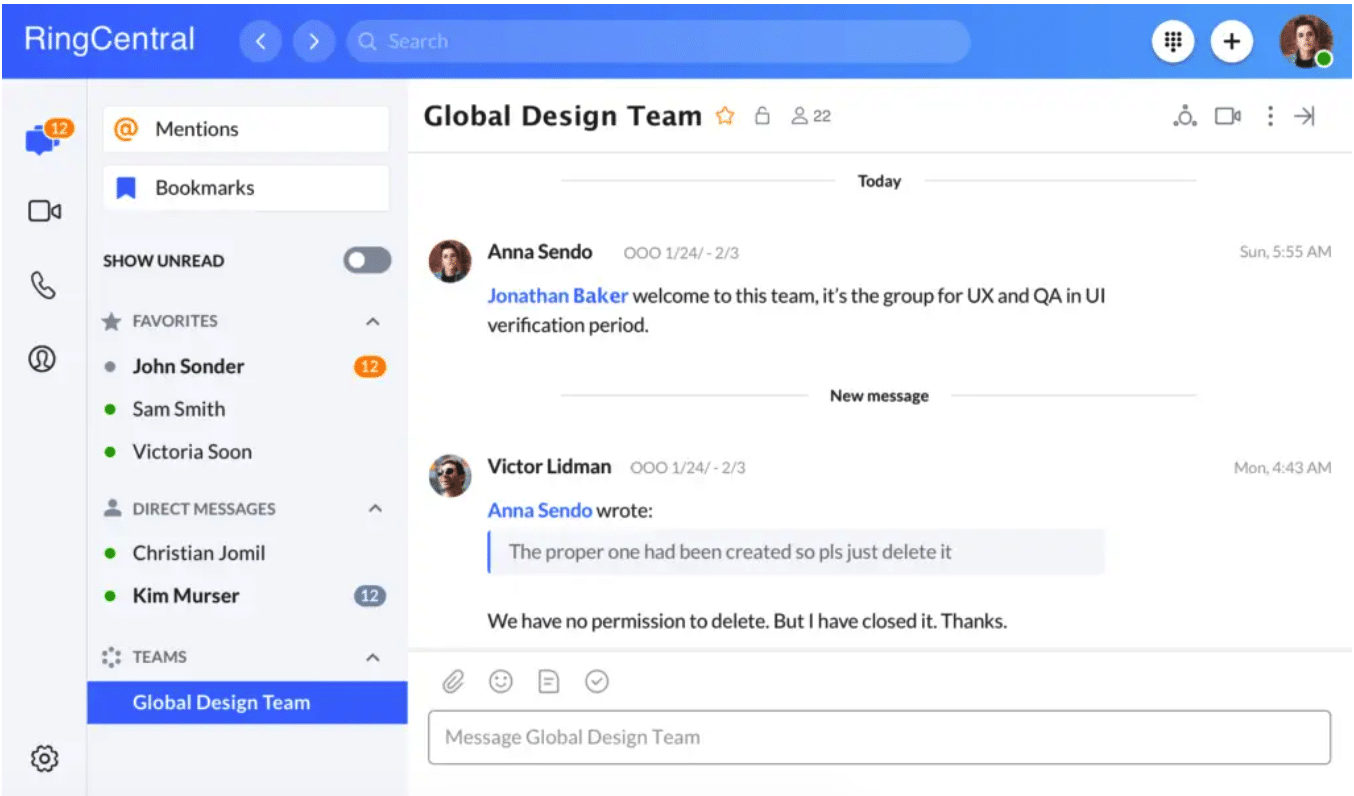Moving from having an initial idea to getting a product to market is not an easy process. You have product development to consider, market research, raising seed capital, marketing, and then actually launching the product itself. Those first few stages can be fraught with hurdles as you focus on innovation and growth.
Here at RingCentral, we have worked closely with many startup companies. One of the foundations of good business is good communication from day 1, and our tools not only help you communicate with customers and suppliers, they can also be an essential part of how you communicate with consultants and other professionals during your early stages.
There are experts out there who can help and guide you through the difficulties of getting a startup off the ground. Startup consultancy firms have many years of experience in advising new startup founders. Business consultants and business consulting services can be a big help, but what can they do for you and should you hire one?
👀 Find out how one consultancy is spotting sales opportunities and optimizing workflows with advanced analytics.
Too much to handle: How consulting can help through different startup stages
Whether pursuing sole entrepreneurship or working in a group of co-founders, there are plenty of challenges ahead for you to overcome before you launch your product to the market. While you may not feel you need outside help with your ideas stage, advice across other crucial stages could be of great benefit and could mean the difference between failure and success.
Having a successful startup company is not just about the idea or product you have. It requires you being aware of your burn rate and other costs too. What sort of systems will help you launch successfully? RingCentral offers a wide range of solutions that are aimed at small businesses and startups, which can be an integral part of your business model—and adopting early is key:

Launching a startup business is much like a chess game. To succeed, you need to be thinking several moves ahead. It is not only about what your idea is, but also what your company will look like. What communication tools will it need to be successful? What may be needed for a physical business will look very different to what is needed if you adopt an ecommerce model.
Once you have your initial idea and are convinced that it has potential, then it is time to look at the stages ahead of you:
- Ideas and research. While your original idea may be a great one, it still needs some work before moving forward. Your idea needs to develop into something that investors will be interested in and that consumers will want to buy.
A consultant’s input at this stage will most likely involve market knowledge and market research. They should know the market, how to help you develop your product and brand, and be able to advise you of any pitfalls you may face. They can also provide a competitive analysis with similar products or services.
- Development. Before you approach potential investors, you need an MVP (minimum viable product) to show them. Without an MVP, it will prove very difficult to obtain the funding you need to progress a product to market. But some ideas are easier than others to get to this stage.
If you are developing an F&B (food and beverage) product, then that is infinitely easier to take to a ready stage than a product that needs precise engineering. Your consultant can not only guide you on what is needed but can also signpost you to people who can help attain that MVP level.
- Fundraising. Perhaps the most difficult and the most important stage. Without the funding to bring your product to market—and all that it entails—then you are unlikely to ever see your product/service being successful.
Many startup consultants specialize solely on this aspect of the process. They not only have a track record in raising seed capital, they also have a wide network of contacts within the investment sector to reach out to. They will also know of any relevant grant schemes or local accelerator/incubator programs or can help with a business plan.
- Market. While some consultants will specialize in raising capital, others will focus on the final stage of getting your product onto the market and available to consumers. They will have in-depth knowledge of your target market as a whole, from demographics through to sales channels, new markets, and potential retail partners.
A big part of that will include your marketing strategy. You may choose to hire a permanent marketing expert or team at this point, but a consultant can help formulate your initial approach including launch events, promotional platforms, etc.
How to communicate and work with a startup consultant successfully
From the moment you decide your idea is something that consumers will want, communications should be part of your planning. One of the great advantages of modern communications is that your partners, consultants, and other people involved in your product development do not need to be close geographically.
If your perfect consultant is located in a different area, then regular video meetings are just as constructive as in-person meetings. Using video conferencing means that you can bring together any involved parties into your discussions, no matter where they are. And it’s not just about those regular meetings.
It’s also about follow-up discussions and regular contact. All of this is made easy for everyone involved by a unified all-in-one solution like RingCentral Office® that also includes messaging and phone. The best part? It’s all in one app. With such a solution, all communication channels are available in one place. With a click or a tap you can conference with a consultant, share your latest business plan, or even try out a product demo.
Many people choose a work-from-anywhere option nowadays. This may be especially true in the early stages of your new business when you may still be working full time. It just makes good business to sense to have a good communications solution that brings your growing team together, in real-time as if you were all in the same office. (Bonus if it can be scaled up later as you grow.)

5 reasons to hire a startup consultant & how to get the most out of it
If you can stay in constant contact with your startup consultant, you’re more likely to make a success of the relationship. In turn, that gives you a greater chance of broader business success. That’s thanks to the many benefits hiring a consultant can deliver.
1. Neutrality
We are often blinded to any flaws in our idea or product. And even those close to us may not offer an unbiased view. A consultant brings a neutral mind to the table—or the video conference.
They will advise on product viability and help construct a plan or roadmap to bring your idea to fruition. They can spot any flaws and help you overcome them if possible. This can all happen remotely—just as effectively as in person—with an HD quality video conferencing solution, like RingCentral.
2. Expertise
Some business consultants will be all-around experts and can guide you from start to finish. Others may offer expertise in one or more particular areas. Identify what areas you need specific help in and then source startup consulting firms that fit those needs. Even a small business may need some specialized assistance at some stage.
3. Management
Startup consulting may not only be about product development, it may be about company development, too. You may, for example, have great computing knowledge, but no idea about how to set up a management template or company structure. A consultant can help identify what structure to follow, what staff you may need to bring in, and if you’ll need things like contact center technology later in your development.
4. Market knowledge and research
A startup consultancy may focus only on this area. They may offer industry-specific knowledge or have the ability to undertake complex tasks such as widespread market research. They have the know-how as to which methodology will give the best answers to shape the next stage. While some of this can be done in-house, their expertise can take you to the next level:

5. Tools and systems
Another advantage of hiring business consultants is that they will not only know your market, but can also identify what tools and systems will most benefit your company. This can include call center tech, the best video conferencing suites, and more. And many consultants recognize the advantages of RingCentral’s integrated communications solutions.
Should you hire a startup consultant?
There is no definitive answer as to whether you should hire a startup consultant. Your decision will depend on a number of factors. What your product is, the potential size of the market, the complexity of the demographics, how many products you are competing against. All these—and more—will inform your decision as to how many benefits a startup consultant can offer.
There is a lot of hard work in all stages of launching a startup, especially if you cannot initially commit to working on it full-time. You may want to keep as many tasks in-house as possible, but a management consulting firm can bring that extra knowhow to the table. Taking your new venture to the next level and increasing your valuation are your main priorities.
Having an expert identify all the needs you might have, from structured financing to cloud communications can help clear muddy waters. When it comes to building a startup, you need to be able to concentrate on multiple subjects, often at the same time. A strong relationship with a startup consultant can take some of the weight off your shoulders.
Effective communication with your consultant is key to building such a relationship. Fortunately, RingCentral Office provides everything you need to do so in the work-from-anywhere era. You can arrange virtual meetings with ease, schedule follow-ups, and stay in ready contact between each conference through integrated messaging.
Many people question whether they can afford to hire a consultant, but perhaps the question should be if you can afford not to hire one.
Originally published Mar 16, 2021, updated Jun 18, 2024





